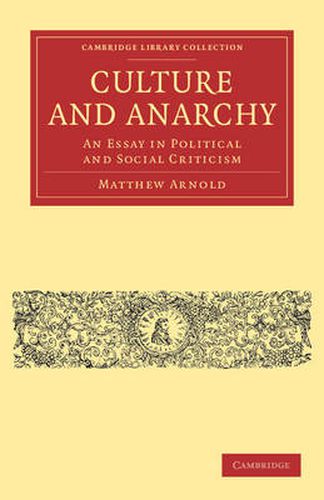Readings Newsletter
Become a Readings Member to make your shopping experience even easier.
Sign in or sign up for free!
You’re not far away from qualifying for FREE standard shipping within Australia
You’ve qualified for FREE standard shipping within Australia
The cart is loading…






By the middle of the nineteenth century, culture was often considered to be nothing but a meaningless ‘smattering of Latin and Greek’. In this work, first published in 1869, Matthew Arnold (1822-88) redefines culture as a striving for ‘the best that has been thought or said’, and as a contrast to ‘philistinism’ and the over-valuation of the practical. Critical of the uninspiring lifestyles of many of his religious and non-religious contemporaries, he raises the controversial issue of how to lead a good life, aesthetically, intellectually and morally. He introduces a middle road between classical and Judaeo-Christian ideals (‘Hellenism’ and ‘Hebraism’) which promotes the state over the individual, a position that has often prompted his critics to consider him an authoritarian thinker. A fascinating piece of social and political criticism, and an adjunct to Arnold’s poetry, this work was both controversial when it was first published, and enormously influential thereafter.
$9.00 standard shipping within Australia
FREE standard shipping within Australia for orders over $100.00
Express & International shipping calculated at checkout
By the middle of the nineteenth century, culture was often considered to be nothing but a meaningless ‘smattering of Latin and Greek’. In this work, first published in 1869, Matthew Arnold (1822-88) redefines culture as a striving for ‘the best that has been thought or said’, and as a contrast to ‘philistinism’ and the over-valuation of the practical. Critical of the uninspiring lifestyles of many of his religious and non-religious contemporaries, he raises the controversial issue of how to lead a good life, aesthetically, intellectually and morally. He introduces a middle road between classical and Judaeo-Christian ideals (‘Hellenism’ and ‘Hebraism’) which promotes the state over the individual, a position that has often prompted his critics to consider him an authoritarian thinker. A fascinating piece of social and political criticism, and an adjunct to Arnold’s poetry, this work was both controversial when it was first published, and enormously influential thereafter.